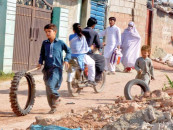Nursing in Pakistan: Handle with care
Nurses are the backbone of medical care and should be treated accordingly

According to figures cited by the Journal of Pioneering Medical Sciences in 2013, the existing nurse-patient ratio in Pakistan is approximately 1:50 whereas the ratio prescribed by the Pakistan Nursing Council (PNC) is 1:10 in general areas and 2:1 in specialised areas. Moreover, the existing nurses are also distributed unevenly across provinces with Sindh facing the severest shortage of nursing staff while Khyber-Pakhtunkhwa has the most nurses. Currently, Pakistan has 162 registered nursing colleges with over 50 students enrolled in each of them annually. These schools are regulated by PNC, which is responsible for approving nursing schools for accreditation, devising the curriculum, licensing nurses to practise and advising the federal and provincial governments regarding nursing education and services. Demand for nurses in the country, however, still continues to exceed supply.

Keith Cash, dean and professor at Aga Khan School of Nursing and Midwifery, talks about the increase in demand for nurses internationally and the shortage of well-qualified nurses in Pakistan. PHOTO: ARIF SOOMRO
One of the primary reasons for the shortage in the nursing industry is due to the general stigma attached to the profession. Nursing is not generally considered a high-prestige job and usually written-off as an option for the less-privileged. “This profession is not the first choice for many,” confirms Salma Rattani, director for the Bachelors of Science in Nursing (BSN) programme at the Aga Khan University (AKU) School of Nursing and Midwifery (SONAM). “Nursing isn’t considered a well-reputed profession and something that is generally meant for women.”
The male-female quota enforced by PNC does little to help the situation either. The male to female ratio observed in a BSN classroom is 10:90, the Post Registered Nurse Bachelors of Science in Nursing (RN BSN) follows a 50:50 quota whereas diploma programmes only offer single-gender courses. “The concept of care is associated with women in our society,” says Noor Khan, coordinator at the Post Graduate College of Nursing in Peshawar. “But hospitals and other institutions where nurses are required need both genders.” Keith Cash, dean and professor at AKU SONAM, however, believes that the quota set by PNC reflects the cultural reality of the country. “It is not culturally acceptable to have male nurses,” he says. “Patients prefer females over male nurses and a [gender] balance in the [nursing] workforce is not right for the Pakistani population.” Khan, on the other hand, states that certain places such as army or surgical male wards prefer male nurses.

Anum’s father, Shiraze Gujrati, working at the Linen and Laundry department at Aga Khan University Hospital. PHOTO: ARIF SOOMRO
Ironically, being considered a ‘female domain’, does not free the profession from the usual biases and challenges for women. According to Rattani, if a female nurse is taking care of a male patient and is required to touch him, it makes people uncomfortable. Similarly, those working odd-hours or in far-off locations are exposed to security risks and sexual harassment threats. According to the District Nurses Association, Peshawar, eight cases of sexual harassment against nurses were filed over the last five months and the problem persists throughout the country, though it may not always be officially reported. Philomina Sadiq, head nurse at the Civil Hospital, Karachi, who has been in this profession for the past 25 years, also shares other challenges that nurses have to face on a daily basis. “When a member of a political party is admitted [at the hospital], there is usually a lot of chaos and we are also threatened,” she says. “Often, patients also break things, misbehave with nurses, beat them and blame them for their family member’s death.”
The wages paid to nurses fail to take these risks into account. A nurse in a private hospital earns between Rs20,000 to Rs22,000 per month whereas those in a public hospital start with a salary of Rs14,000 per month. “Nurses work gruelling shifts. They are exposed to life-threatening infections but still diligently perform their jobs,” says Khan. “Yet, we are not valued accordingly in the market and given fewer incentives and facilities.” Rattani adds that the nursing pay scales are not adjusted in accordance with the rising inflation rate either. According to Cash, the lower pay scale can also be attributed to gender discrimination. “Females always get paid less than males. It’s just the way it works in many places,” he adds.

The lack of uniform standards across nursing schools in the country is an additional problem faced by those working in the public sector, which eventually leads to demotivation and brain drain. “A Faculty of Science graduate like myself who opts for a diploma in nursing and then further completes his Masters is given equal credentials as a Bachelors of Science Honours in Nursing,” says Khan. He adds that in other industries, completing 16 years of education directly qualifies you for a grade 17 job in the public sector, while he was hired as a grade 16 officer despite having completed the same years of education.

A Post RN BSN class at Aga Khan University Hospital, School of Nursing and Midwifery. The school enrolled a total of 117 nursing students this year. PHOTO: ARIF SOOMRO
The shortage of nurses, however, is not just a local problem. Infact, the downward trend is affecting medical care worldwide. WHO estimates that the world needs to increase the number of health workers by more than four million to achieve the global health goal in 2015 set by the Millennium Development Goals. Countries like Phillipines and India, which have an abundance of nursing staff, have already capitalised on this trend by exporting medical workers to developed countries like the United States, Canada and United Kingdom. And with the right research, planning and investment, Pakistan has the chance to benefit from similar gains, both at home and overseas.
A helping hand
The nursing industry continues to be mired in challenges, but some brave on despite the hindrances. “Coming from an underprivileged house, it was almost impossible to complete a diploma course which costs about Rs400,000,” says 21-year old Anum Shiraze Gujrati about her dream of pursuing a career in nursing. Things, however, took a positive turn after she was awarded a 50% merit-based scholarship at the AKU SONAM where she enrolled for a nursing diploma.

“I didn’t have enough money to pay for her course,” says Shiraze Gujrati, Anum’s father, who has been working at the linen and laundry department at AKU for the past 27 years. All his concerns, however, were relieved when the organisation extended monetary assistance to support his daughter’s dream. Half of Anum’s financial aid loan was exempted and only Rs 1,500 are deducted from her father’s salary every month. Anum does not take her good fortune lightly and plans to channel it positively. “Once I get my license after a year of internship, I have plans of completing BSN and then Post RN BSN,” she says, adding that her education will help her bridge the gap between theory and practice.
Nisma Chauhan is a subeditor on The Express Tribune magazine desk. She tweets @ChauhanNisma
Published in The Express Tribune, Sunday Magazine, December 7th, 2014.



















COMMENTS
Comments are moderated and generally will be posted if they are on-topic and not abusive.
For more information, please see our Comments FAQ